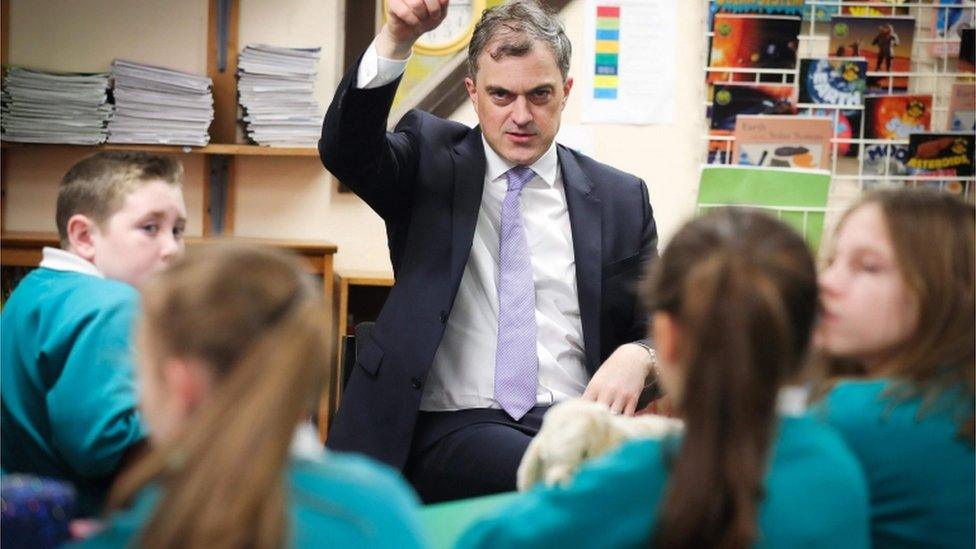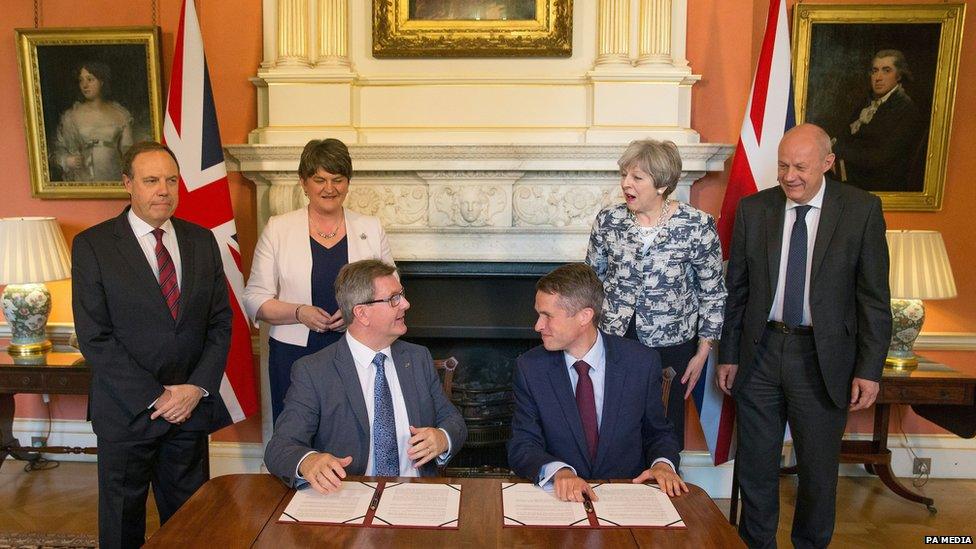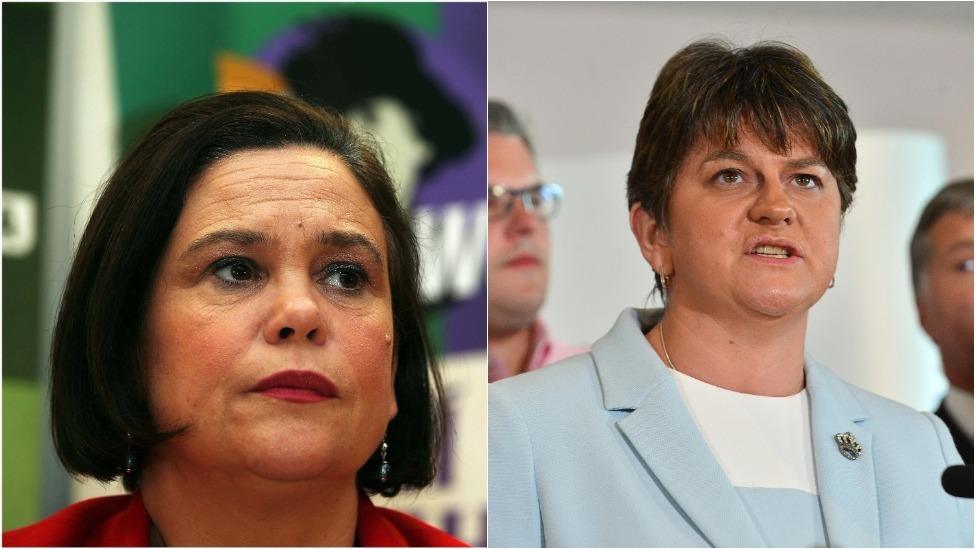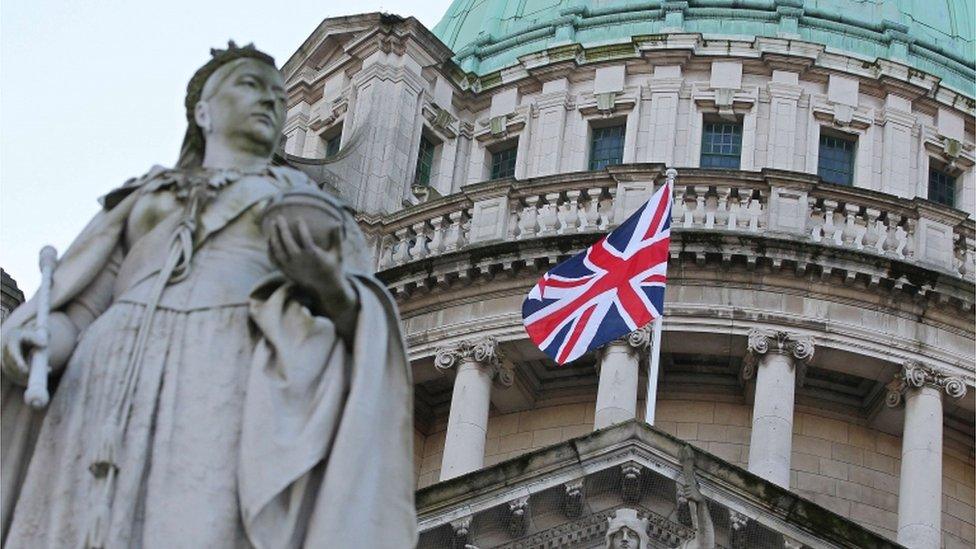Stormont deal: Your questions answered
- Published

NI Secretary Julian Smith was key in help unlock the political impasse
Northern Ireland's political parties have returned to government after agreeing to a deal put forward by the British and Irish governments.
The British and Irish governments published the draft on Thursday night in an attempt to restore the executive after three years of political deadlock at Stormont.
On Saturday the DUP, Sinn Féin, the SDLP, UUP and Alliance all entered into the executive, bringing the paralysis to an end.
We answer your questions on what the deal contains and how it could work.
I see this deal comes with money from Westminster. What happened to the £1bn the DUP secured in exchange for support for Theresa May, particularly now everything has changed in Westminster? - Mick O'Reilly
The £1bn secured by the DUP was in return for it propping up Theresa May's minority Conservative government and covered a two-year period from June 2017 to June 2019.
The money was split between infrastructure, broadband, education, deprivation and health.
All the money has been spend apart from the broadband proportion.
A procurement process is underway which will see the broadband project implemented over the next few years.
But the deal was not renewed when it came to an end, and in December, Boris Johnson won a majority and did not need the DUP's support.

The DUP signed a confidence and supply agreement with Theresa May's Conservatives
Why were we dependent on two parties agreeing? Why are all the parties not involved in getting the executive up and running?
The five biggest parties - the DUP, Sinn Féin, Alliance, the SDLP and the UUP - have all been involved in the talks to some degree and all five are entitled to seats at the executive table.
But the British and Irish governments have been most focused on the DUP and Sinn Féin as the largest unionist and nationalist parties respectively.
The way the Stormont system of government is set up means it cannot function without the largest unionist and nationalist parties filling the positions of first minister and deputy first minister.
This was agreed in the 2007 St Andrew's Agreement when devolution was restored after a suspension of almost five years.

Sinn Féin leader Mary Lou McDonald and DUP leader Arlene Foster were big players in the negotiations
I would like some reference to the protection of loyalist culture. People talk about an Irish language act but no reference or questions have been raised about loyalism/unionism being protected - David Dynes
The draft deal proposes creating an Office of Identity and Cultural Expression. There would be two commissioners, one who would "recognise, support, protect and enhance the development of the Irish language" and the other who would "enhance and develop the language, arts and literature associated with the Ulster-Scots/British tradition".
There is also a section in the deal entitled "promoting Northern Ireland's culture, heritage and society" which states the British government will work alongside the executive to mark the centenary of Northern Ireland in 2021.
It also states the union flag would be flown on government buildings in Northern Ireland on three extra days each year while a "connected classroom programme" would provide young people in Northern Ireland with the opportunity to "connect, engage and collaborate with other young people across the UK".

Belfast City Hall is among many buildings in Northern Ireland which only fly the union flag on set days
How will the translation hub work? Will it be possible for anyone to debate in Irish in the assembly chamber? Will scrutiny committees also conduct business in Irish and require translators?
The deal says a central "translation hub" will be set up to provide Irish and Ulster-Scots translation services for the nine executive departments, "arm's length bodies", local government and public bodies.
Anyone will be able to speak in the assembly chamber or in assembly committees in either Irish or Ulster-Scots but this would be simultaneously translated so that those who do not speak those languages can understand what is being said.
If you are reading this page on the BBC News app, you will need to visit the mobile version of the BBC website to submit your question on this topic.